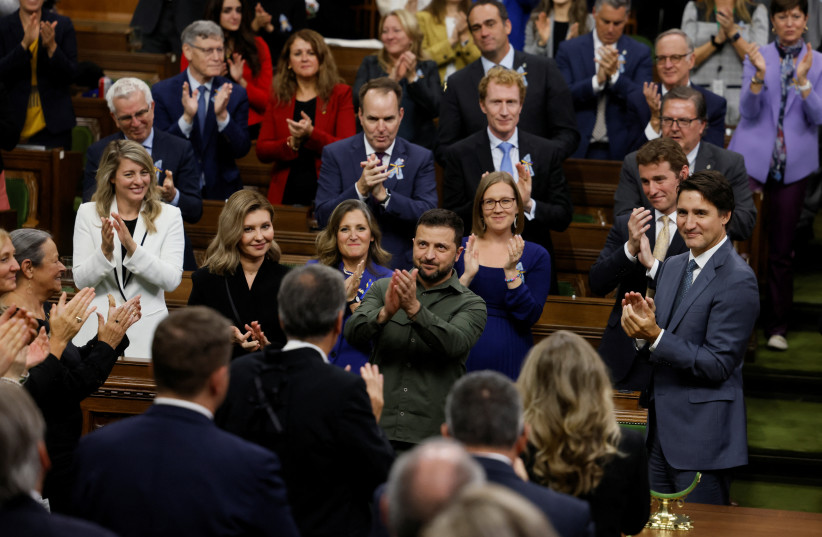Resignation of Canada’s speaker of the House of Commons lower chamber is a “first step to acknowledging responsibility for this wrong," Israel's new Special Envoy for Combating Antisemitism, Michal Cotler-Wunsh told The Jerusalem Post this week. She added that Canada needs to acknowledge its historic sin of not allowing enough Jews into the country during the Holocaust and immediately afterward while allowing Nazis to immigrate.
The speaker of Canada's House of Commons lower chamber said last week that he would quit, a few days after he publicly praised a former Nazi soldier in Parliament in an incident that Russia said helped justify its war on Ukraine.
A week ago, Anthony Rota told legislators he had made a mistake by inviting ex-soldier Yaroslav Hunka, 98, to attend a session in the House honoring Ukrainian President Volodymyr Zelensky last Friday. Rota publicly recognized Hunka, calling him a hero.
Cotler-Wunsh emphasized that the next steps should include “Canada acknowledging and coming to terms with its history of the nearly 2,000 documented Nazis who immigrated to the country following WWII and built lives, at the same time as the immigration policies towards Jewish victims was ‘none is too many’ as documented by historian Irving Abella in a book by that title,” she said. “None is too many" was the response given by a high-level Canadian government official when asked how many Jews should be accepted during the Holocaust.
“At a time of rising antisemitism, the beyond embarrassing incident in parliament underscores the imperative of comprehensive education on antisemitism then and now, on the Holocaust and on the history of WWII.

“The very possibility of its occurrence undermines the responsibility of countries like Canada to the shared prospective commitment of ‘Never Again’ - demanding to remember and know the past in order to identify present threats and prevent recurrence of atrocities too terrible to imagine but not too terrible to have happened,” Cotler-Wunsh concluded.
Guest of Canadian parliament was a Nazi
The speaker's position rapidly became untenable after it emerged that Hunka, who received two standing ovations from lawmakers, had served in one of Adolf Hitler's Waffen SS units during World War II. Russia called the incident outrageous.
"That public recognition has caused pain to individuals and communities, including the Jewish community in Canada and around the world...I accept full responsibility for my actions," said Rota, a member of the ruling Liberal party, adding his resignation would take effect on Wednesday. Until then a deputy speaker will be in charge.
The episode played into the narrative promoted by Russian President Vladimir Putin that he sent his army into Ukraine last year to "demilitarize and denazify" the country, a charge Kyiv and Western allies say is baseless.
The furor helped tarnish the visit by Zelensky, who thanked Canada for the billions of dollars in aid and weapons it has provided since Russia invaded in February 2022.
Earlier this week, former Canadian federal justice minister Irwin Cotler, and the stepfather of Cotler-Wunsh, criticized Canada's historical indifference and inaction regarding Nazis in the country, in an interview to CTV. Cotler called for nearly 40-year-old documents on suspected war criminals living in Canada to be unsealed, specifically those from the Deschênes Commission of Inquiry on War Criminals in 1985.
The commission identified hundreds of members of the Waffen-SS Galicia Division living in Canada but did not consider their membership as a war crime. Cotler emphasized the need for transparency, accountability, and justice in addressing Canada's history with Nazi war criminals.
"As it has always been said, sunlight is the best disinfectant, and we need to be fully transparent, so that we can bring about the necessary understanding of what, in fact, took place," Cotler said to CTV.
"This was a failure here of indifference and inaction by successive Canadian governments, the result being that we became a sanctuary for Nazi war criminals, and no accountability would then ensue,” he concluded.
